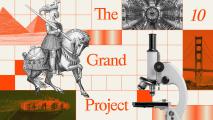Starting a business in one of the world’s oldest markets — personal care products — is a daunting task. As an industry worth hundreds of billions globally, many entrepreneurs struggle to see an entry point in what seems like a saturated market. Enter Hawthorne, a premium men’s personal care company that was founded in 2016 and has evolved from a simple digital storefront to selling products in more than 1,000 retail stores across the US.
The idea for the business came when CEO Brian Jeong and cofounder Phil Wong realized that the vast majority of the personal care market was geared toward women. Men had relatively few options.
Watch the full video on Hawthorne:
“There’s an opportunity here, and that is both getting the right products for you and creating an accessible experience where guys don’t have to go into a Sephora, guys don’t have to go into a department store,” Jeong told Freethink.
Hawthorne’s edge is personalization. The company developed an online quiz that’s designed to match customers with products that fit their tastes and body type. The quiz, which is based on feedback from thousands of consumers, asked questions ranging from “How often do you shampoo?” to whether the customer is introverted or extroverted.
The result is a one-stop-shop for premium men’s personal care products, such as cologne, shampoo, and deodorant — all of which feature natural ingredients made in the US.
But creating products to match so many different needs required a ton of research and development. Even more difficult was the fact that Hawthorne was attempting to establish itself in an established industry with so many players, meaning there was an almost endless amount of data to research. Hawthorne’s founders resolved to bridge that gap.
“We were entering into a perfume and cologne industry that had been around for 100+ years,” Jeong told Freethink. “We had no beauty experience, we had no personal care experience. We had no fragrance experience. We didn’t understand the inner workings of the industry. And we said, ‘We’re gonna get as smart as we can as quick as we can.’”
Emphasizing research in a saturated market
The personal care market has long been hard to crack. After all, trends can change quickly and, like the fashion industry, taste in products is largely subjective. Cologne and perfume formulas are often tightly kept secrets.
In an interview with Harvard Business School, Geoffrey Jones, author of Beauty Imagined: A History of the Global Beauty Industry, reflected on the hardships of researching the personal care industry:
“First of all, this is a difficult industry to research. Historically, it has been quite fragmented, with many small and often family-owned firms whose stories are hard to reconstruct. The industry as a whole is well known to be secretive – after all, its foundations rest heavily on mystique.”
That famous mystique is what Hawthorne hoped to reveal with its quiz, removing the guessing game for customers. To generate the right questions and answers, Jeong realized that Hawthorne needed the help of industry experts from those small and family-owned firms.
“We basically went on a tour of talking to 100 different people in a span of three weeks, setting up in coffee shops, running across the city, having conversations with anyone who could provide us insight,” Jeong told Freethink.
Backed by the knowledge of industry experts, Hawthorne’s quiz was demystifying men’s personal care and, from the company’s online storefront, making it easier to access. But Hawthorne still needed a product line to match all of their customers’ needs. A blessing in disguise came to help: a network of industry experts.
Networking and learning on the go
“At the end of each of these meetings, we would always ask that person, ‘Is there anyone else we should be talking to?’” Jeong told Freethink. “[Because] originally we started with 10 people on our list that we wanted to talk to, and that 10 became 100.”
In their research, Jeong continued to find more people willing to help. Each individual offered some nugget of information that proved useful, whether it was a marketing technique, a fragrance pairing, or a potential legal issue. There was value in it all. To manage that much information meant Jeong needed to be adaptable, capable of learning on the go.
Geoffrey Jones offered his own nugget regarding what it took to succeed in the industry:
“Creative talent, astute marketing skills, and the ability to understand and respond rapidly to consumer fashions and preferences are all needed to succeed.”
Jeong’s network of industry experts helped the young company better understand and respond to consumer preferences. It ultimately helped turn Hawthorne’s online storefront into a successful business — and one that’s on trend with the broader market. After all, consumer and marketing data firm Statista predicts that nearly one third of personal care revenue will be generated online in 2022, and up to 45% by 2025.
Hawthorne’s success didn’t come from a single innovation, but rather it was built brick by proverbial brick. Remaining flexible in the research and development phase gave Hawthorne the ability to maneuver upward in an industry that Jones described as “fiercely competitive, with thousands of product launches every year.”
When it all came together, Jeong had created an online store, featuring a personalized quiz, selling a line of products to match, and all backed by the centuries-old insight of a massive industry – that trends are always changing, and to be successful, a business has to quickly adapt.
From just an online storefront in 2016, to launching in 95% of Target stores, Hawthorne has become a leading name in men’s personal care. Jeong reflected on what it took to be an entrepreneur, what it took to build Hawthorne.
“The essence of an entrepreneur is someone who is learning things on-the-go. When we realized Hawthorne was the idea that we wanted to pursue, it wasn’t a single moment in time, it was as we learned more, as we gathered more information, as we spent more time building it — our excitement level just increased.”





